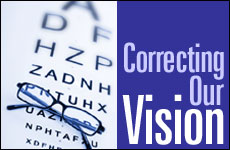 Iran’s Attack on Israel
Iran’s Attack on Israel


4 min read
Why did God create so many of us with faulty vision?
I’ve been thinking a lot about eyeglasses lately.
I was sitting at the steering wheel ready for my three hour drive home after spending the day out of town with friends.
One of my friends saw a defect in my eyeglasses and asked if he could fiddle around with them. He has lots of experience fixing glasses. I appreciated his offer, let him tinker with them and didn’t think twice.
Minutes later he returned with a very apologetic face. One of the lenses was split into two, and the frames were unusable. "In all my years, this has never happened to me," he said. I was speechless.
I tried my best to make him feel that I was not angry, and my wife, who loathes driving long distances at night, took over.
Within days, my friend quickly made amends and everything is back to normal now. But I'm still thinking about eyeglasses. I have very poor eyesight and prior to that mishap, I don’t remember the last time I had to see blurry for such a long time.
Eyeglasses first appeared in Pisa, Italy, around the year 1286 and only in the late 14th and 15th centuries did they begin to be mass-produced on some level. What did people with poor eyesight do before eyeglasses were invented? How did they live?
Thank God I live in a world where my problematic eyesight is so easily fixable. But what’s with God? Since He’s perfect and all-powerful, why did He create so many of us with faulty vision?
He didn’t give us fingers that would only work if we attached a metal or glass mechanism to them. Yet according to the Vision Council of America, approximately 75% of adults use some sort of vision correction. Why did God make a world where the vast majority of people need corrective lenses in order to see properly?
There is very powerful lesson here. We have eyes but we cannot see. We are incapable of clearly seeing anything without help.
We look at everything in the world and we think we are seeing it unmistakably. We think we see exactly what is there in front of us in plain sight.
But in reality, we are always seeing blurry.
Do we look for the good in people or for their faults?
We judge other people. We condemn situations and circumstances. Yet, we actually possess very poor eyesight. We need to attach the ‘proper lenses’ to give us the right perspective and vision in order to look at the world appropriately. Do we look for the good in people or for their faults? Do we look at situations as random occurrences or do we try to see the underlying message guided by Divine providence?
An unkempt man was touring the Louvre with a group of tourists. As they were scanning Rembrandt's works the man yelled, "Yogurt!" Everyone thought he was nuts. But he said it again, "It looks like yogurt to me."
Then they passed by the Mona Lisa. Again he exclaimed, "Yogurt!" A wise man on the tour looked at the fellow. "Let me see your glasses."
He gave him his glasses. "What did you have for breakfast today?" he asked.
"Some cereal and yogurt," he answered.
The wise man cackled. “Look at your glasses! They are dotted with yogurt! No wonder everything you look at appears as yogurt!” (Parable of Rav Mordechai Pogramanski, pre-WW2 European scholar)
Everything we look at depends upon the lenses we are looking through.
A person with the quality of a good eye and a clean, positive lens, does not hate others, nor does he get angry with them. He does not covet what others have, because he sees everything positively without any ‘yogurt.’ If he is lacking something it is because God is telling him that he doesn’t need it, and he is happy for his friend who does have it.
We have eyes but we need to correct our vision and work on seeing people in a positive light. These are the eyeglasses we must wear at all times.
The Sages tell us that the 2nd Temple was destroyed as a result of baseless hatred, sinat chinam. During this period of the Three Weeks leading to the mournful day of Tisha B'Av when the Temple was destroyed, we are all trying to improve ourselves and our relationships with others.
One key way to better our relationships with others is to judge them favorably, looking at them in an positive way. When we live with this attitude in the courtrooms of our minds, we avoid the roots of negative vibes which often lead to hatred.
Now's the time to get your eyes examined and check your glasses, and wipe away any remaining yogurt.
